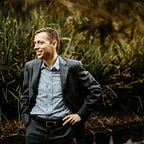The books that most influenced my work in innovation and business transformation in 2018
This year again I read a lot of articles and books on business transformation and innovation. At the end of 2017 I had shared for the first time the books that had most influenced my work that year and thought I would make this a yearly exercise from now on. So it might not have the sales impact of recommendations from the Financial Times, FastCompany or Bill Gates but below are my three favourites reads from 2018, in no particular order.
“I’m wondering what to read next.” Matilda said. “I’ve finished all the children’s books.” Roald Dahl, Matilda
Reinvent your business model: how to seize the white space for transformative growth, by Mark W. Johnson.
I had not read seizing the white space by Mark W. Johnson when it was initially released in 2010. I had not yet discovered the business model innovation universe back then. So I was really curious to read its updated version “Reinvent your Business Model” and I was ready to dive in as soon as it was released in the summer 2018.
Given my current work in the innovation space it really felt like meeting an old friend, with so many common convictions, stories, etc. I have to say that I was impressed by the clarity of the business model innovation thinking, the conceptual depth and so many great cases, including Dow Corning Xiameter, Hilti, Hindustan Unilever and the Shakti Initiative, Better place, Zara.
One area where the book fell short for me is to transform all this great thinking into impactful visuals and usable tools. See the four-box business model for instance. I can understand why this would be in the 2010 version of the book, but in 2018 it feels a bit like denial not to use Alex Osterwalder’s version of the Business Model Canvas.
But apart from this little “faux pas”, this is still one of my most useful business reads this year.
“Business management at its best is so much more than executing already-existing business models — it is the art and science of exploring and discovering disruptive new ones that ensure a future of sustained growth and longevity.” Mark W. Johnson
A world of three zeros: the new economics of zero poverty, zero unemployment, and zero net carbon emissions, by Muhammad Yunus.
I have a lot of respect for Muhammad Yunus and his demonstrated ability to implement ideas that change the world. I was impressed by the boldness of the book’s project and curious to read M. Yunus’s convictions on how to solve the three massive problems of poverty, unemployment and climate change. It’s always such a great learning experience to read someone who thinks at a systemic level, and test your own convictions on large systemic change against theirs.
The key take-away for me in a world of three zeros is on the critical role of entrepreneurship if these transitions towards 0 unemployment and 0 poverty are to be successful. And it all starts indeed with a simple shift of how we see ourselves, but a shift with so many positive impacts on the required recalibration of our expectations from the state and society we live in.
“The redesigned economic engine has 3 basic elements. First we need to embrace the concept of social business — a new form of enterprise based on the human virtue of selflessness. Second, we need to replace the assumption that human beings are job seekers with the new assumption that human beings are entrepreneurs. Third, we need to redesign the entire financial system to make it work efficiently for the people at the bottom of the economic ladder.” Muhammad Yunus
21 lessons for the 21st century, by Yuval Noah Harari.
And he’s back! This year again a book by Yuval Noah Harari made it to my top reads. It is not per say a business book but it is definitely a book that helped me better question and better understand the world we live in, including its business aspects.
I have once more been impressed by Harari’s talent for pattern recognition, the conceptual clarity with which he explains complex problems in simple terms. and his unmatched gift to tell the story of our time. Now a word of warning: 21 lessons for the 21st century is sometimes depressing, often very funny and always very thought-provoking. I can’t recommend it enough!
“In 1938 humans were offered three global stories to choose from, in 1968 just two, in 1998 a single story seemed to prevail; in 2018 we are down to zero” Yuval Noah Harari
Other books I have read this year with nuggets of business wisdom:
- Gamechangers: creating innovative strategies for business and brands, by Peter Fisk
- Emotional Agility: get unstuck, embrace change and thrive in work and life, by Susan David
- Economix: how and why our economy works, by Michael Goodwin, Dan E. Burr
That’s it! Hopefully those books are available at your local library, or easily downloadable on your smartphone/tablet.
One final anecdote: In 2018 I started working closely with an author that was on my 2017 books’ list and that I had not met at the time. Let’s see if this happens again this year!
